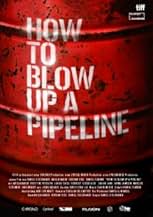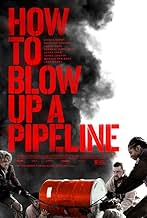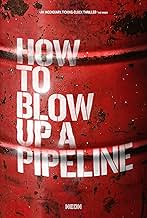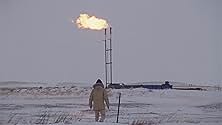A crew of environmental activists plot a daring plan to disrupt an oil pipeline.A crew of environmental activists plot a daring plan to disrupt an oil pipeline.A crew of environmental activists plot a daring plan to disrupt an oil pipeline.
- Awards
- 5 wins & 16 nominations total
Featured reviews
I did enjoy 'How to Blow Up a Pipeline', but I couldn't help but want to rewatch 'The East' (dir Batmanglij, 2013), which had a similar structure (re denouement), but the stakes seemed higher in 'The East', and the psychology of the characters were a lot more deep and varied. I think that was because you come at 'The East' from the point of view of an outsider, and you watch her character arc alongside that of the eco-terrorists, and see how interacting with them changes her (and changes you, as a viewer, too).
But, even so, I'm very glad I did watch 'How to Blow Up a Pipeline', and the film made me want to read the source material.
But, even so, I'm very glad I did watch 'How to Blow Up a Pipeline', and the film made me want to read the source material.
Recently, when a bunch of "Just Stop Oil" activists disturbed a World Snooker Championship game and, as per Gen-Z-climate-activist tradition, threw food all over the tables and sat themselves down in their anti-oil garments, a Twitter user quipped: "These types of climate protests are so detrimental to raising actual awareness and widespread support that if it ever came out that these people were paid for by gas and coal-owning billionaires I'd probably believe it".
Now, I don't know if the companies behind the well-made but questionable How to Blow Up a Pipeline have any such dubious ties (neither the production companies nor the distributor, Neon, have any deals with Big Oil that I could find). But man, what a time to do a psyop to make the enemy look deranged when said enemy will agree with the assessment and be proud of it!
Here is a movie loosely based on a book -- whose name-similarity to some kinda Dark Web instruction manual isn't accidental -- that speaks straight-out about how violence is a necessity for "climate justice"; essentially how destruction is correct so long as it's (purportedly) in the name of the right cause. I guess I shouldn't be too shocked. It was racism in 2020, it's climate change now; I just thought it was gonna be less mask-off terror apologia and more trying to rationalize throwing soup at art to make fossil fuels go away.
Then again, the book predates all those incidents and this manner of disruption was fairly commonplace in Sweden, the author's homeland, before the big vandalism stories of recent UK and US news. Perhaps the real surprise is that it came out after the Nord Stream incident -- an as-yet-unresolved case (of POSSIBLE eco-terrorism) that damaged decidedly more than "replaceable property" (what many radicals will tell you is the only real victim, even on a bad day). Not that this ever really stopped at "property", especially among the new wave of post-Thunberg soup Zoomers.
I sometimes ask: If, for example, a patient dies inside an ambulance as a result of road-blocking climate protestors -- as has literally happened in, you guessed it, Sweden a few months ago -- is that person deemed a necessary sacrifice for the utopia? After all, what's one death vs. The doomsday you've been told you're preventing? Do you redirect the trolley to kill one human when there are 8 billion hypothetical humans on the other track?
I accuse people of pussyfooting around this query, but I realize they've been answering me through actions for some time. When activists were convicted for the incident in Sweden, there were additional manifestations -- not in the name of the person that died, but the ones that got arrested.
Will a film like this exacerbate things? Hopefully not. It's being praised by the Usual Journalists for portraying the "terrorists" (sometimes in quotes, sometimes not) in a sympathetic light, but I didn't read them as outright unblemished. Someone will go "This was my Joker" but someone always does.
Now, I don't know if the companies behind the well-made but questionable How to Blow Up a Pipeline have any such dubious ties (neither the production companies nor the distributor, Neon, have any deals with Big Oil that I could find). But man, what a time to do a psyop to make the enemy look deranged when said enemy will agree with the assessment and be proud of it!
Here is a movie loosely based on a book -- whose name-similarity to some kinda Dark Web instruction manual isn't accidental -- that speaks straight-out about how violence is a necessity for "climate justice"; essentially how destruction is correct so long as it's (purportedly) in the name of the right cause. I guess I shouldn't be too shocked. It was racism in 2020, it's climate change now; I just thought it was gonna be less mask-off terror apologia and more trying to rationalize throwing soup at art to make fossil fuels go away.
Then again, the book predates all those incidents and this manner of disruption was fairly commonplace in Sweden, the author's homeland, before the big vandalism stories of recent UK and US news. Perhaps the real surprise is that it came out after the Nord Stream incident -- an as-yet-unresolved case (of POSSIBLE eco-terrorism) that damaged decidedly more than "replaceable property" (what many radicals will tell you is the only real victim, even on a bad day). Not that this ever really stopped at "property", especially among the new wave of post-Thunberg soup Zoomers.
I sometimes ask: If, for example, a patient dies inside an ambulance as a result of road-blocking climate protestors -- as has literally happened in, you guessed it, Sweden a few months ago -- is that person deemed a necessary sacrifice for the utopia? After all, what's one death vs. The doomsday you've been told you're preventing? Do you redirect the trolley to kill one human when there are 8 billion hypothetical humans on the other track?
I accuse people of pussyfooting around this query, but I realize they've been answering me through actions for some time. When activists were convicted for the incident in Sweden, there were additional manifestations -- not in the name of the person that died, but the ones that got arrested.
Will a film like this exacerbate things? Hopefully not. It's being praised by the Usual Journalists for portraying the "terrorists" (sometimes in quotes, sometimes not) in a sympathetic light, but I didn't read them as outright unblemished. Someone will go "This was my Joker" but someone always does.
When I read about "How to Blow Up a Pipeline", I just had to see this movie. It is a timely political thriller that follows a group of eco-saboteurs who target an oil pipeline. Led by Xochitl, played by Ariela Barer, the group includes a diverse mix of characters, each with their own reasons for taking drastic action against the things that are killing the planet. The movie intercuts between their operation in Texas and flashbacks that reveal each character's motivations. We follow the group's nerve-wracking operation in Texas, where they check out their target, rig up explosives, and then set about doing the deed. Despite its political leanings, the movie doesn't preach or glamorize its characters, and the actors deliver strong performances that bring the characters to life. A very enjoyable movie to watch.
How to Blow Up a Pipeline is a punchy film with a pertinent message.
It follows a group of environmental activists who, you've guessed it, hatch a plot to blow up a pipeline. The plot tracks them as they begin to enact their plan, and also delves into each of their back stories to reveal why they have arrived at this drastic course of action.
It makes for a compelling watch I must say. Each of the characters are interesting and distinct, and delving into their backstories is engaging. The performances are all very solid.
Visually the film is appealing but sparse, with few bells and whistles. It looks rugged and rough which works well.
In terms of pacing it does leave a little to be desired. There are a few troughs, but actually I found the whole thing more thrilling than I was expecting.
The result is a thoroughly entertaining and engaging film with a strong and timely message at its core.
It follows a group of environmental activists who, you've guessed it, hatch a plot to blow up a pipeline. The plot tracks them as they begin to enact their plan, and also delves into each of their back stories to reveal why they have arrived at this drastic course of action.
It makes for a compelling watch I must say. Each of the characters are interesting and distinct, and delving into their backstories is engaging. The performances are all very solid.
Visually the film is appealing but sparse, with few bells and whistles. It looks rugged and rough which works well.
In terms of pacing it does leave a little to be desired. There are a few troughs, but actually I found the whole thing more thrilling than I was expecting.
The result is a thoroughly entertaining and engaging film with a strong and timely message at its core.
It was a well crafted film from start to finish by Goldhaber, fuelled by a young and talented cast, especially in Lucas Gage's performance. The choice of flashbacks were sensibly done, something I'd normally avoid saying. It was a cheeky move executed confidently by Goldhaber using peak points of tension to cut back and learn about the characters. It worked, and strengthened the audience's connection with each character. The film had a hard time finding a consistent level of maturity. It plays more as a YA novel wanting to be like Mission Impossible. The stakes were high, but it lacked some unexpected sacrifice that would come with an emotionally charged team, driven by revenge to attack the oil industry in Texas. The reason it still worked is because the cast was so youthfully motivated and their energy kept things grounded in plausibility.
This cast and crew did a spectacular job in creating a sense of a blockbuster with a festival film. And though my phone screen was found to be shattered after the screening was over at TIFF, I enjoyed the film. Looking forward to more from the filmmakers.
This cast and crew did a spectacular job in creating a sense of a blockbuster with a festival film. And though my phone screen was found to be shattered after the screening was over at TIFF, I enjoyed the film. Looking forward to more from the filmmakers.
Did you know
- TriviaMalm's book (How to Blow Up a Pipeline) is a work of nonfiction that uses a history of social justice movements to argue that property destruction should be considered a valid tactic in the pursuit of environmental justice.
- ConnectionsFeatures Spy x Family (2022)
- SoundtracksChamomile
Written, Performed, and Produced by Cameron Burt (as Winslow Leach)
- How long is How to Blow Up a Pipeline?Powered by Alexa
Details
- Release date
- Country of origin
- Official site
- Language
- Also known as
- How to Blow Up A Pipeline
- Filming locations
- Production companies
- See more company credits at IMDbPro
Box office
- Gross US & Canada
- $750,010
- Opening weekend US & Canada
- $115,453
- Apr 9, 2023
- Gross worldwide
- $1,046,811
- Runtime1 hour 44 minutes
- Color
- Aspect ratio
- 1.78 : 1
Contribute to this page
Suggest an edit or add missing content








































